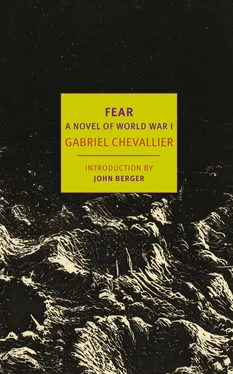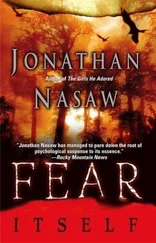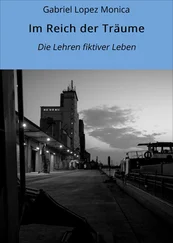With that moment of madness I was risking prison. But honour where honour’s due! This senseless act, which could have been the end for me, put a stop to our persecution. Afterwards the corporal tried to make friends with us. We made it clear that this would be even more repugnant than his hatred, and that in any case we were not afraid of him any more. But this thug had spoilt our first month at the front and poisoned in advance the new life we were hoping for.
For several weeks, we had to march all over the place. We did our cooking in the open air and slept under canvas. I remember two marches in particular. One was on a scorching hot day when we all succumbed to the heat. Our battalion fell apart completely leaving groups of men staggering about like sunstroke victims by the roadside. Some tried to drag themselves along, others flopped down in the fields, or attempted to force their way on to passing convoys. True to my principles, I had dropped out of the ranks at the start. I knew I couldn’t make it to the end and told myself it was better not to wait till I was exhausted. By the end of the day, the march looked like a rout.
The second march took twelve hours and lasted right through the night. We were ordered to set off without any warning. The whole battalion was half-asleep and we marched with our eyes shut, bumping into each other. At every halt we nodded off by the roadside. Night marches are dreadful, because there is nothing to look at, nothing to catch your attention and to take your mind off your worn-out body. We were constantly forced into the ditches by ammunition wagons galloping past, by columns of lorries and heavy supply buses which paid no heed to the staggering columns of infantry. The traffic raised up thick clouds of white dust, which stuck to our sweating faces like a brittle glaze. We were a troop of ghosts and old men, and all we could do was keep crying out for a breather. But always the whistles would summon us back up on our feet, set in motion our onerous role as beasts of burden, until it no longer felt like a march with a destination but a journey to the end of a night that spread across the earth into infinity.
We were shaken out of this torpor by a world in flames. We had just marched over the crest of a hill, and suddenly there before us lay the front line, roaring with all its mouths of fire, blazing like some infernal factory where monstrous crucibles melted human flesh into a bloody lava. We shuddered at the thought that we were nothing but more coal to be shovelled into this furnace, that there were soldiers down there fighting against the storm of steel, the red hurricane that burned the sky and shook the earth to its foundations. There were so many explosions that they merged into a constant roar and glare. It was as if someone had set a match to the petrol-soaked horizon, or an evil spirit was stoking up the flames in some devil’s punch-bowl, dancing naked and sneering at our destruction. And so that nothing was missing from this macabre carnival, so that there was something to highlight the tragedy by its contrast, we saw rockets rising gracefully, like flowers of light, fading at the summit of this inferno and dropping down, dying, trailing stars. We were mesmerised by this spectacle, whose poignant meaning only the old hands knew. This was my first sight of the front line, my first sight of hell unleashed.
It was on the following day that I felt an itch and slipped my hand into my trousers to find something soft which stuck under my fingernail. I pulled out my first louse, pallid and fat, the sight of which made me shudder with disgust. As I was concealed by a hedge, I checked through all my clothes. The creature already had a few companions, and in the seams and hems I found the little white dots of their eggs. I was contaminated, but I still had to keep these repulsive clothes, endure the tickling and the biting of the vermin, to which my imagination lent an incessant activity. The foul family must now prosper upon my body, month after month, and contaminate my intimate life with its multiplication. This discovery demoralised me and made me hate my solitude, now haunted by a swarm of parasites. Lice marked the fall into ignominy and a man could only escape this squalor of war by spilling his blood. Heroes now lived as sordidly as the denizens of night shelters, and their quarters, filthier than those shelters, were also deadlier.
The whole area behind the front line was swarming with troops of all kinds. Since the few villages could not provide shelter for so many soldiers, primitive encampments had sprung up everywhere, with tents, huts and barracks, spreading their smoke across the countryside. Every clump of trees, every gulley hid a tribe of combatants, busy preparing food or doing their washing. The landscape had been devastated: the ground churned up by tramping feet, military transport and general depredations, covered in debris and rubbish. It bore the mark of that desolation which armies always bring to the regions they traverse. Only wine was in plentiful supply. The lukewarm barrels in the canteens dispensed oblivion to those who had the money to fill their flasks.
In the morning, we heard a buzzing in the air, and up in the blinding blue sky where the sun breaking through the last patches of mist promised a scorching day, we could see an aeroplane climbing up, dipping and turning like a lark. We watched it for a long time until it dissolved into the atmosphere way off in the distance so that there was nothing left but a glittering shard of mica fluttering in the wind. How we envied that man up there who made war in the purity of the heavens, an angel with a machine gun.
Before us, the line of observation balloons, known as ‘sausages’, marked the front line, the thundering front of the attack sector, whose rage reached us in waves of dull thuds. Sometimes we would pass frantic columns of lorries on the road, full of haggard infantrymen, some of them venting their joy at having survived in frenzied cries that sounded like curses, others just stretched out, still as corpses, and all of them stained with blood and dirt. These were the troops who had just distinguished themselves at Notre-Dame-de-Lorette, Le Labyrinthe, Souchez, and La Targette, and we knew from the number of empty lorries the price these regiments had paid for clawing from the enemy a few ruined houses or a few bits of trench.
The battalion finally moved to quarters a few kilometres behind the front, in a village where we could reorganise ourselves. The road passing through this village was the main thoroughfare for the whole Neuville-Saint-Vaast sector. So we were posted at a crossroads and could get a picture of life at the front through the movement of relief troops, supply columns and ambulances. The permanent traffic jams on the access roads forced units to wait under our gaze for a long time. We were thus able to observe at close quarters men who had already fought, terrifying, hardened men who were returning to attack again. They uttered nothing but curses, as if to spit in the face of death, but we could see the anxiety beneath the bravado, at the edge of despair. They were shepherded by officers with tense faces, in plain uniforms, officers who would mix in with them, rarely seemed to stand on ceremony and kept orders to a minimum. The soldiers hung around in preoccupied groups by the rifle stacks, argued bitterly with the NCOs whom they threatened with terrible retributions, and whenever no one was looking would rush off to the few places in the village where they could get a drink. Many were drunk, and not only the ordinary soldiers. In the evening they would slowly take the road that led back up there. The uproar they made would slowly fade, soon lost in the noise of the bombardment into which they were marching.
We slept on straw in huts of wood and tarpaulin that were swelteringly hot in the daytime. We were used as navvies, repairing old trenches in readiness for a new offensive. We set off at dusk, marched for a long time through former positions. Once we got to the right spot we were assigned our tasks in groups of two: one pick, one shovel. After a certain hour, the nights were calm. We could only hear the crackle of grenades far away, and brief fusillades, and see rockets going up: stray bullets buzzed like mosquitoes. A few artillery shells exploded ahead of us, also far off, and an invisible battery, somewhere down in the shadows, barked its response. We returned to camp at daybreak and had the morning to rest.
Читать дальше












